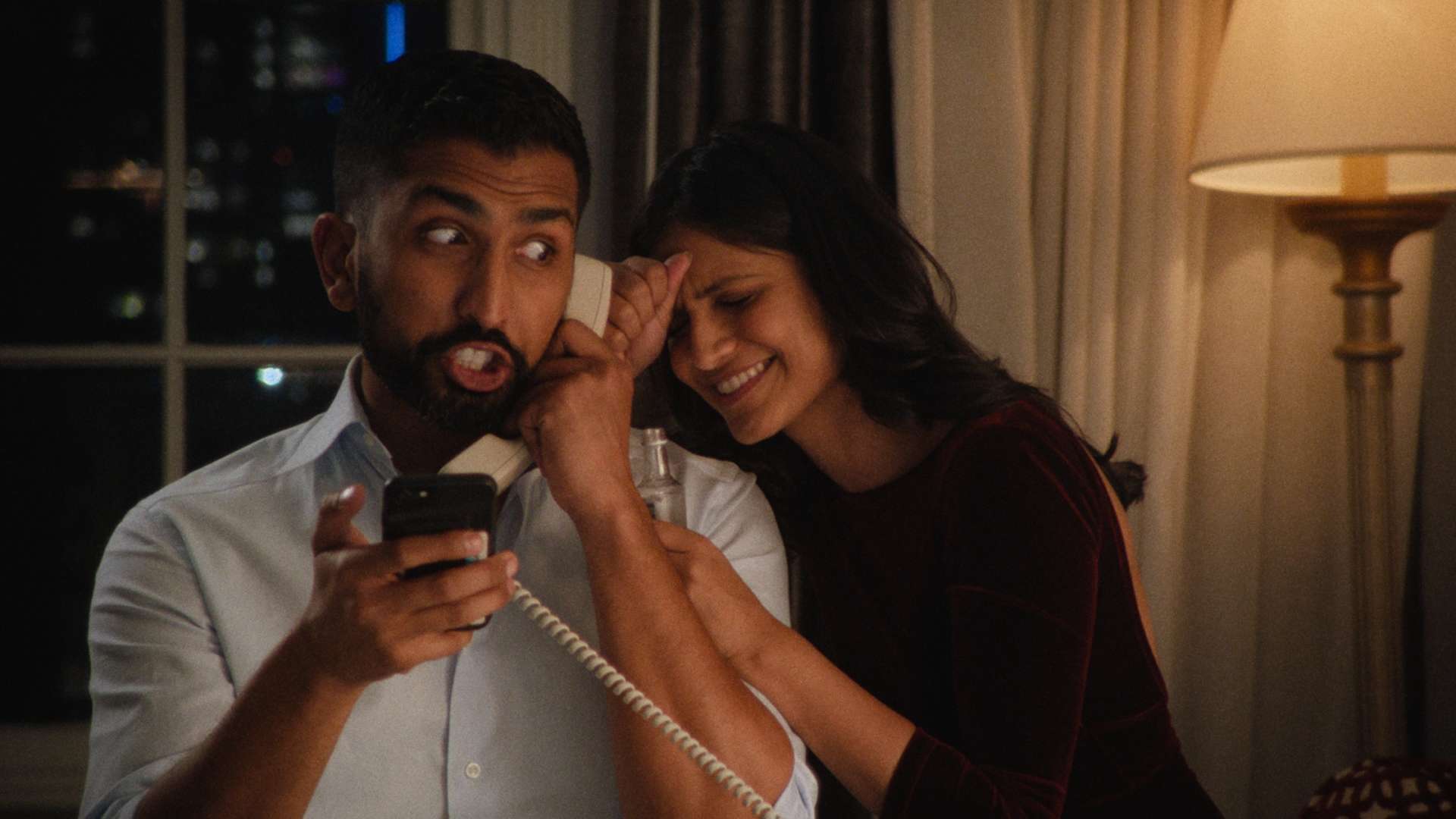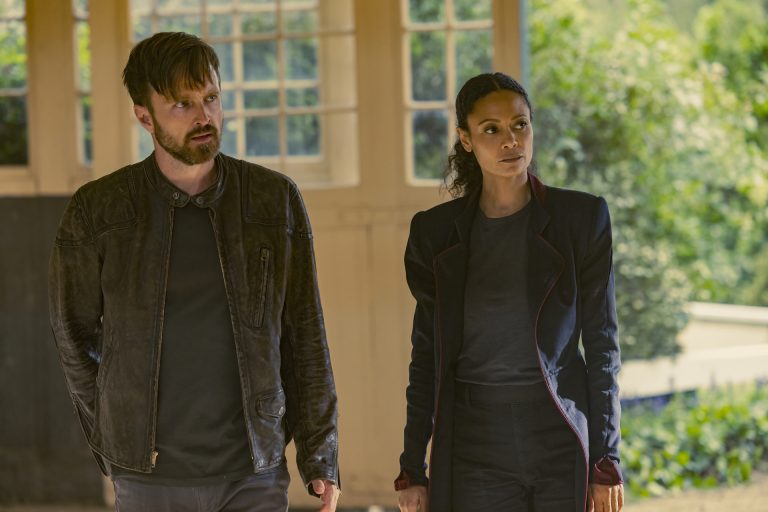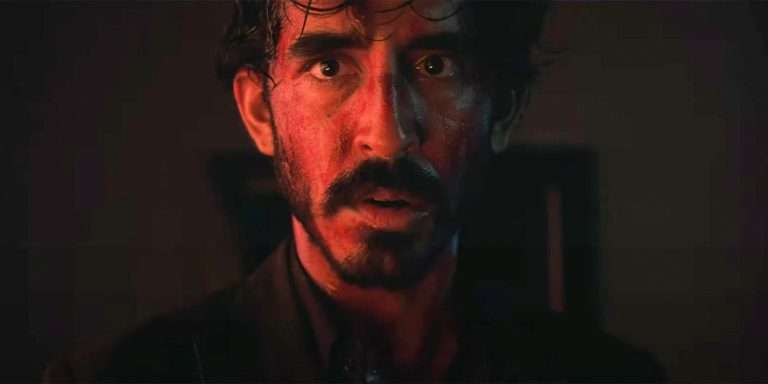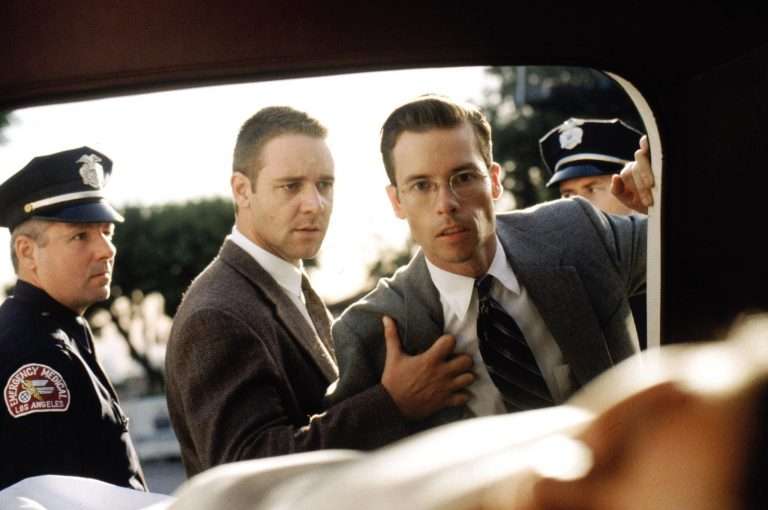When COVID-19 swept the world, many cultural prognosticators predicted that the art resulting from the pandemic would form a canon unto itself. It seemed obvious that people would make powerful art in response to the alarming status quo of 2020. But while we have seen a lot of gimmicky fares like The Bubble and Sick, very few films have looked at the human condition during COVID. Footnotes, written and directed by Chris Leary, is a romantic comedy that actually succeeds in charting that territory with some poignance, even if its mumblecore-esque first act conflicts with the more mainstream sensibility of the latter sections.
Leary has had to wear many hats to bring this project to fruition: in addition to writing and directing the picture, he is a producer and the sole editor. Did I mention he also plays the main character? Correct: Leary plays Will, a bored web designer who helps his neighbor Apurna (Sharayu Mahale) move in right before the lockdown descends. The film establishes that it is set in 2020 with a snippet of radio news, thus announcing that it’s set during an uncertain time in human history with minimal fanfare. This is quite unconventional: it would have been very easy to start the film with a newsreel montage recounting the spread of the coronavirus as seen on CNN.
The opening is followed by a sequence where we see vignettes of Will living alone, intercut with a scene of him on a call with his mother. A little while later, he meets Apurna again when she knocks on his door looking for toilet paper. A friendship blossoms, and Will finds himself drawn to Apurna’s charms even as she warns him that a relationship is off the table. As time passes and the two get closer, their dynamic grows more complicated, especially when a former beau of Apurna’s (played by the dashing Vishal Patel) enters the picture.
The first act of Footnotes, which ends at around the forty-minute mark, is beautiful. It plays like a two-hander, sticking to Will and Apurna without any other characters entering the frame. The filmmakers evoke both the loneliness of lockdown and the warmth of living close to someone you love with aplomb, and the film carefully highlights the fragile nature of the siloed world that Will and Apurna inhabit. They start spending more and more time together, relying on only each other’s company to get through each day. This isolation is a part of the film’s construction (for example, we never even hear the people on the other side of calls). Even at this point in the movie, it is obvious that this relationship will develop in complicated ways once the lockdown ends–the outside world can only be shut out for so long.
These parts of the film draw from the sweet sincerity of Leary and Mahale’s performances. The actress, in particular, is a beaming presence, lighting up the screen and invigorating scenes like the one where Apurna explains her family nickname to Will. There’s a sweetness to these characters that Footnotes thrives off of- scared by the onset of lockdown, they are incredibly grateful for each other. This warmth radiates off the screen.
It is quite remarkable how well this is presented. Clearly operating off a small budget, Leary and his team build immersive scenes through careful usage of montage and set coverage. Character beats land thanks to the thought put into each sequence, and the apartments of the film have a superb lived-in quality to them (it is likely that these apartments were literally being lived in during production, but putting that on screen is still a feat). The cinematography (by Victor Ingles) and mise en scène are also excellent–the spaces on screen feel defined by the internalities of the characters.
I would not be surprised to learn that Leary started this project by completing the script for the first section of the story and then expanding it to feature length with additional characters and plot beats. That is what it feels like, at least, since the latter half of the film puts it firmly in the category of more mainstream romantic comedies. It is difficult to square some of the elements that are introduced after a turning point that occurs at the forty-minute mark; suddenly, scenes open with pop music playing in the background, there are big character reveals punctuated with exaggerated sound effects, and characters undergo cleanly dramatic reunions and changes in outlook. The authenticity of the first act is lost to these parts of the film, which appeal to a different kind of audience altogether. A less engaged one.
And this might have been what the entire film was leading to; the small-scale naturalism of the first act might have come about by necessity, not design. This is also evident in the dialogue, which is delivered with eloquent precision and none of the improvisational traits of mumblecore delivery (uhs, ahs, and the like). But still, there is a simplicity to the first forty minutes of the film that the rest betrays by piling on overcomplicated drama centered around a forced love triangle. The story veers off from true-to-life to Hollywood fairly quickly.
That brings us to the ending, which is the most perplexing element of the film. Coming off of the somewhat contrived drama of the second and third acts, the film attempts to leave the characters in something resembling irresolution. The final scene itself, in particular, is a bizarre inclusion that one is left unsure what to make of. (It could be a flashback (and a devastating one at that), but this is unlikely because the characters aren’t wearing masks.) And while it is nice that the filmmakers decided to end the film on a relatively realistic note, it is more likely that audiences will be left feeling like they just saw a romantic comedy without an ending. While it is certainly impressive that the filmmakers were able to make this film feel like a mainstream romantic comedy, they can’t have their cake and eat it too.
That said, it is easy to identify what Leary and his team were reaching for here. The pandemic, especially the lockdown period, feels like a compartmentalized part of our reality that we will (likely) never return to. This film constitutes a series of flashes of life from another era, and such compartmentalized episodes are common in people’s lives. They arrive and come to a close, leaving loose ends and fractured emotions in their wake. Footnotes is about such chapters and the regret they inspire, a bittersweet depiction of the tragedy inherent to such endings.



![Mandela [2021] Netflix Review – A Social Commentary on Power](https://79468c92.delivery.rocketcdn.me/wp-content/uploads/2021/05/Mandela-Netflix-768x432.jpg)

![Winter Boy [2022] ‘TIFF’ Review: An Affecting And Personal Meditation On Loss & Grief](https://79468c92.delivery.rocketcdn.me/wp-content/uploads/2022/09/Winter-boy-2022-review-768x384.jpg)

